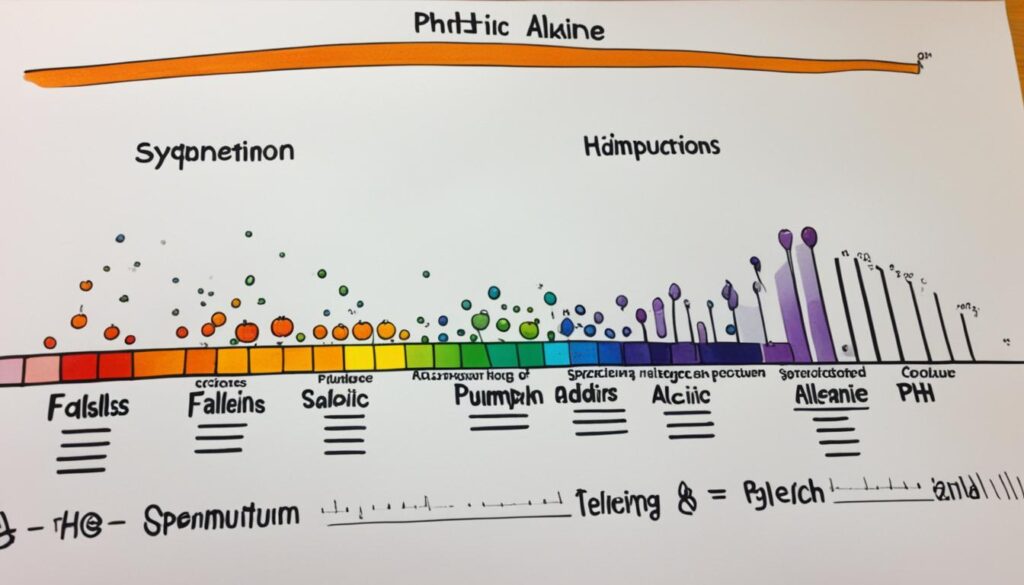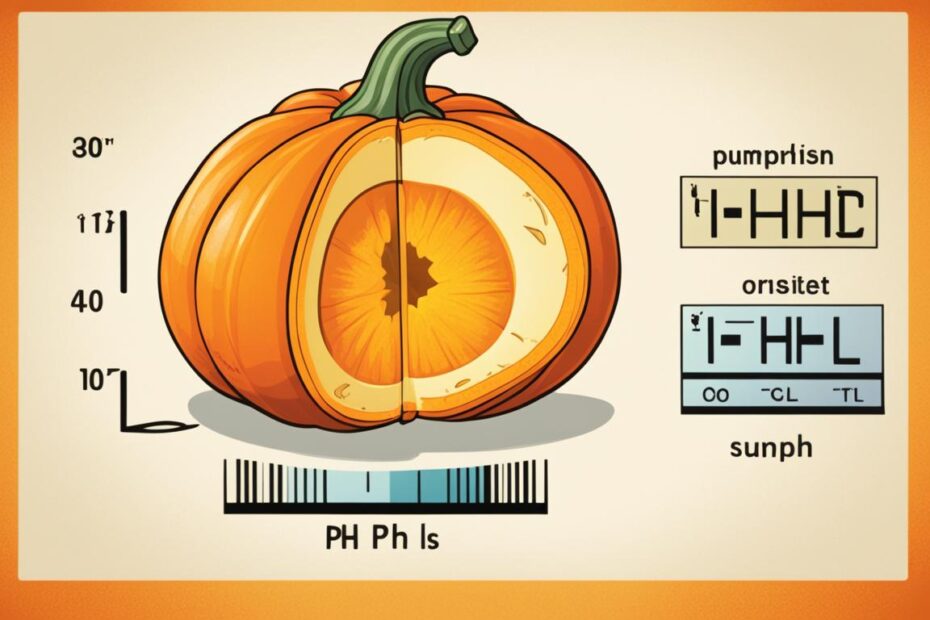When it comes to maintaining a healthy diet, understanding the pH levels of the foods we consume is essential. But what about pumpkins? Are they alkaline or acidic? The answer may surprise you!
Pumpkin, a beloved fall staple, falls into the mildly alkaline category when it comes to pH levels. According to the alkaline food chart, pumpkin is considered an alkalizing food due to its low acid content and high mineral content, including calcium and magnesium.
But does this mean that pumpkin is completely alkaline in all forms? Let’s explore the nuances and uncover the truth about pumpkin’s pH level.
Key Takeaways:
- Pumpkin is classified as a mildly alkaline food based on the alkaline food chart.
- Its low acid content and high mineral content contribute to its alkalizing effect on the body.
- Pumpkin’s pH level may vary depending on how it is prepared, but overall, it falls into the alkaline category.
- Incorporating alkaline foods, such as pumpkin, into your diet can support a balanced pH level in the body.
- Remember, pH levels are regulated by the body, and the alkaline diet alone is not a cure-all for health issues.
Understanding the Alkaline Diet
The alkaline diet is based on the concept that certain foods can affect the pH levels in the body. Proponents of this diet believe that consuming more alkaline foods and reducing acidic foods can promote better health. According to the acid-alkaline food chart, vegetables, fruits, nuts, and legumes are considered alkaline, while meat, dairy, grains, and processed foods are acidic.
By incorporating more alkaline foods into your diet, you can maintain a balanced pH level in the body, which is believed to have various health benefits. Alkaline foods are typically rich in essential nutrients, including vitamins, minerals, and antioxidants, that support overall well-being.
However, it’s important to keep in mind that while diet can have some impact on urine pH, it does not significantly affect blood pH. The body has natural mechanisms in place to regulate pH levels and maintain homeostasis. So while following the alkaline diet can contribute to a healthier lifestyle, it’s not a magical solution to all health issues.
“You can optimize your diet by incorporating more alkaline foods and reducing acidic options. Remember, it’s all about balance.”
Table: Alkaline vs. Acidic Foods
| Alkaline Foods | Acidic Foods |
|---|---|
| Vegetables (e.g., spinach, broccoli) | Meat (e.g., beef, chicken) |
| Fruits (e.g., berries, apples) | Dairy (e.g., milk, cheese) |
| Nuts (e.g., almonds, walnuts) | Grains (e.g., wheat, rice) |
| Legumes (e.g., lentils, chickpeas) | Processed Foods (e.g., chips, soda) |
Remember, maintaining a well-rounded, nutrient-rich diet is crucial for overall well-being, and consulting with healthcare professionals is always advisable.
The Benefits of Alkaline Foods
Alkaline foods, such as pumpkin, offer several potential health benefits. They are rich in essential nutrients, including vitamins, minerals, and antioxidants, which support overall well-being. Alkaline foods also help maintain the body’s pH balance, which is important for optimal function.
By incorporating more alkaline foods into your diet, you may experience the following health benefits:
- Improved Digestion: Alkaline foods can help reduce acidity in the digestive system, promoting better digestion and preventing issues like acid reflux and heartburn.
- Increased Energy Levels: Consuming alkaline foods can boost your energy levels, providing sustained energy throughout the day and reducing fatigue.
- Enhanced Immune Function: Alkaline foods are known for their immune-boosting properties, helping to strengthen the body’s defense mechanisms against infections and diseases.
- Better Bone Health: Alkaline foods, including pumpkin, contribute essential minerals like calcium and magnesium, which are vital for maintaining strong and healthy bones.
By maintaining a balanced pH level through the consumption of alkaline foods, you can support your overall well-being and improve various aspects of your health. So why not add more alkaline foods like pumpkin to your diet and enjoy the benefits they offer?

A Nutrient-Rich Alkaline Food Table
| Food Category | Examples |
|---|---|
| Vegetables | Kale, Spinach, Broccoli, Bell Peppers |
| Fruits | Avocado, Watermelon, Lemon, Lime |
| Nuts and Seeds | Almonds, Chia Seeds, Flaxseeds, Pistachios |
| Legumes | Black Beans, Chickpeas, Lentils, Kidney Beans |
Table: Nutrient-Rich Alkaline Foods
Debunking pH Myths
There are several misconceptions surrounding pH levels and their impact on health. While it is true that pH plays a role in certain bodily processes, such as digestion and enzyme function, the body has sophisticated mechanisms to regulate pH levels and maintain homeostasis. The idea that the alkaline diet can cure or prevent diseases like cancer is not supported by scientific evidence. Additionally, the pH of the foods we consume may affect urine pH, but it has minimal impact on blood pH. It is important to approach pH-related claims with skepticism and consult reliable sources for accurate information.
“The body has numerous complex mechanisms to regulate its pH levels and preserve its delicate balance. Many people have been misled by the myth that the alkaline diet is a panacea for all health problems. While maintaining a balanced diet is essential for overall well-being, solely relying on alkaline foods to prevent or cure diseases like cancer is unfounded.”
Paying attention to pH levels and incorporating alkaline foods into your diet can contribute to a more balanced internal environment. However, it is crucial to understand that pH levels are tightly regulated by the body and that the alkaline diet alone is not a definitive solution. Achieving optimal health requires a holistic approach, including regular exercise, stress management, and a variety of nutrient-rich foods.
The Myth of the Alkaline Diet
One of the most prevalent misconceptions is the belief that the alkaline diet can cure various diseases and ailments. Advocates of this diet claim that consuming more alkaline foods and reducing acidic foods can create an alkaline environment in the body, thereby preventing diseases like cancer. However, there is no scientific evidence to support these claims.
In reality, the body has intricate systems in place to regulate its pH levels and maintain a relatively stable state called homeostasis. The stomach, for example, secretes hydrochloric acid to aid digestion, resulting in an acidic environment. This natural acidity is necessary for proper breakdown and absorption of nutrients.
“The human body possesses a remarkable ability to balance its pH levels and ensure optimal functioning. It is erroneous to believe that the alkaline diet alone can counteract or prevent diseases. Rather, it is crucial to adopt a well-rounded, balanced diet that includes a variety of nutrient-rich foods.”
Furthermore, while the pH of the foods we consume can influence the pH of our urine, it does not significantly impact the pH of our blood. The body tightly regulates blood pH, maintaining it within a narrow range of 7.35-7.45, regardless of the foods we consume. Thus, claims that an acidic diet leads to acidic blood or that an alkaline diet can raise blood pH are baseless.
It’s important to approach pH-related claims with a critical mindset and seek reliable scientific sources to separate fact from fiction. Consulting with healthcare professionals and registered dietitians can provide valuable guidance when it comes to dietary choices and overall well-being.
| Myth | Fact |
|---|---|
| The alkaline diet can cure diseases like cancer. | There is no scientific evidence to support this claim. |
| An acidic diet results in acidic blood. | The body tightly regulates blood pH, maintaining it within a narrow range regardless of dietary acidity. |
| Urine pH reflects blood pH. | While urine pH can be influenced by diet, it does not necessarily indicate blood pH. |

By debunking the pH myths surrounding the alkaline diet, we can focus on evidence-based practices that support our overall health and well-being. Remember, maintaining a balanced diet that includes a variety of nutrient-rich foods is key, rather than adhering to potentially misleading dietary claims.
Conclusion
In conclusion, the alkaline food chart reveals that pumpkin is mildly alkaline, making it a beneficial addition to your diet. Incorporating pumpkin and other alkaline foods can contribute to a balanced pH level in your body, promoting overall health and well-being.
However, it’s essential to understand that pH levels in the body are tightly regulated, and the alkaline diet alone is not a cure-all for health issues. While alkaline foods like pumpkin can support a balanced pH, maintaining a well-rounded, nutrient-rich diet is crucial for optimal health.
Consulting with healthcare professionals can provide personalized guidance on achieving and maintaining a balanced pH level. They can help ensure you’re meeting your nutritional needs and offer advice on incorporating alkaline foods into your diet. Remember, a holistic approach to health that includes a variety of nutrient-rich foods is key to your overall well-being.
FAQ
Is pumpkin an alkaline or acidic food?
Pumpkin is considered to be mildly alkaline based on the alkaline food chart. It falls into the alkalizing food category due to its low acid content and high mineral content, including calcium and magnesium.
What is the alkaline diet?
The alkaline diet is based on the concept that certain foods can affect pH levels in the body. It promotes consuming more alkaline foods like vegetables, fruits, nuts, and legumes, while reducing acidic foods such as meat, dairy, grains, and processed foods.
What are the health benefits of alkaline foods?
Alkaline foods, including pumpkin, offer several potential health benefits. They are rich in essential nutrients, vitamins, minerals, and antioxidants, which support overall well-being. Alkaline foods also help maintain the body’s pH balance, aiding digestion, increasing energy levels, enhancing immune function, and promoting better bone health.
Are pH levels important for health?
While pH levels play a role in certain bodily processes, the body has sophisticated mechanisms to regulate them and maintain homeostasis. Consuming alkaline foods may affect urine pH but has minimal impact on blood pH. Claims that the alkaline diet can cure or prevent diseases like cancer are not supported by scientific evidence.
Can the alkaline diet alone improve health?
Maintaining a well-rounded, nutrient-rich diet is crucial for overall well-being. While incorporating alkaline foods into your diet, including pumpkin, can contribute to a balanced pH level in the body, it is important to consult with healthcare professionals and not rely solely on the alkaline diet as a cure-all for health issues.
